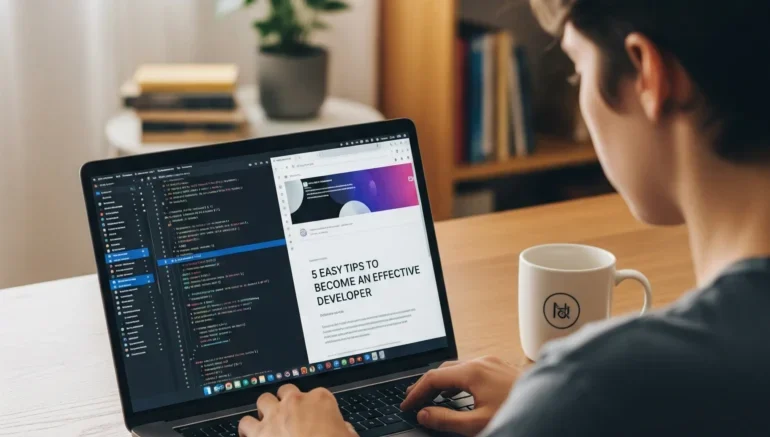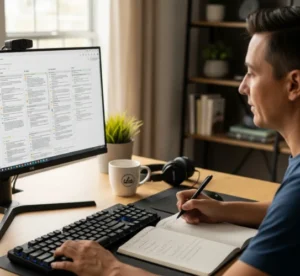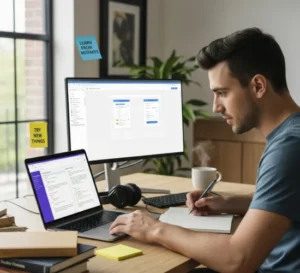
5 Easy Tips to Become an Effective Web Developer
Becoming an effective web developer is more than just writing lines of code. It’s about finding ways to work better, stay focused, and continue improving your skills over time. Many beginners think it’s all about memorizing commands or learning a new programming language, but being effective means balancing technical knowledge with the right habits and mindset. The good thing is, you don’t need to do everything at once. With a few simple changes in the way you approach your work, you can steadily grow and get better every day.
If you’ve ever felt stuck or unsure of how to improve as a developer, you’re not alone. Every successful programmer started from the basics and built their skills step by step. What matters is being consistent and staying open to learning. In this guide, we’ll go over 5 easy tips to become an effective web developer. These tips are practical, simple, and something you can start doing today. By applying them, you’ll not only improve your coding abilities but also make your workflow smoother and more enjoyable.
Here’s 5 Easy Tips to Become an Effective Web Developer
Keep Learning and Practicing Regularly
Technology changes quickly, and developers need to keep up with it. Learning doesn’t stop once you’ve learned a single programming language or tool. In fact, the best way to stay effective is to make learning a part of your routine. You don’t need to spend hours every day studying, but even dedicating 30 minutes to reading, watching tutorials, or experimenting with code can make a big difference over time.
Practicing regularly is just as important as learning. The more you write code, the more comfortable you become at solving problems. Instead of waiting for the “perfect moment” to start, take on small projects that interest you. These projects don’t need to be big, even a simple app or website can help you sharpen your skills.
 Here’s how you can keep learning and practicing:
Here’s how you can keep learning and practicing:
- Join coding challenges: Sites like HackerRank or Codewars improve your problem solving skills.
- Work on mini projects: Build small apps to sharpen coding skills.
- Follow tutorials: Learn and apply new developer techniques.
- Experiment with frameworks: Explore new tools and languages.
Write Clean and Organized Code
Writing code isn’t just about making it work, it’s also about making it easy to read and maintain. Many new developers rush to get results, but effective developers focus on writing clean and structured code. Think of it like writing a book, if the sentences are messy and confusing, no one will want to read it. The same applies to your code.
Clean code is easier for you and others to understand later. It also helps reduce errors and makes debugging faster. To get into this habit, start with simple practices like using clear variable names, adding helpful comments, and breaking your code into smaller functions. Over time, these small habits will make your code more reliable and easier to manage.
 Here are some tips to keep in mind:
Here are some tips to keep in mind:
- Use clear variable names: Descriptive names make your code easier to follow.
- Keep functions short: Small, focused functions are easier to test and reuse.
- Avoid repeating code: Use loops or functions to reduce duplication.
- Add helpful comments: Explain tricky parts but avoid over commenting obvious code.
Time Management for Effective Web Developers
Being an effective developer isn’t just about coding faster, it’s about using your time well. Many developers get stuck spending hours on one problem when they could have managed their tasks better. Learning how to prioritize your work and break it down into smaller parts can make you more productive and less stressed. Start by creating a daily or weekly plan of what you want to achieve. Make sure your goals are realistic so you don’t feel overwhelmed. If you run into a problem, take short breaks to refresh your mind before coming back to it. Time management is not about working longer, it’s about working smarter.
 Here are some helpful strategies:
Here are some helpful strategies:
- Break tasks into smaller steps: Tackling small goals makes progress easier.
- Plan your day or week: Setting clear priorities keeps you focused.
- Use project management tools: Platforms like Trello or Notion help organize tasks.
- Set limits on distractions: Block social media or notifications.
Learn to Communicate and Work with Others
Many people picture developers working alone, but the truth is that most projects require teamwork. Being able to communicate your ideas clearly and collaborate with others is one of the most important skills for an effective developer. Even if you’re confident in your coding, poor communication can lead to misunderstandings and wasted effort.
Start by practicing how you explain your code or ideas in simple terms. Good developers know how to make their work understandable for teammates who may not have the same technical knowledge. Listening is just as important as speaking, pay attention to feedback and use it to improve your work.
 Some simple ways to build this skill include:
Some simple ways to build this skill include:
- Explain ideas simply: Ensure both technical and non-technical teammates understand.
- Listen actively: Use feedback to improve your work.
- Join group projects: Learn to collaborate with different skill sets.
- Share progress regularly: Keep everyone aligned and informed.
Growth Mindset for Effective Web Developer
The most effective developers are those who never stop being curious. They don’t see mistakes as failures but as opportunities to learn. Having a growth mindset means being willing to try new things, accept challenges, and learn from both successes and errors. This mindset will keep you motivated, even when the work gets tough. Staying curious also means exploring beyond your comfort zone. If you’re used to one programming language, try experimenting with another. If you’ve only built websites, try working on a small mobile app. These new experiences will make you more flexible and confident in your skills.
 Here’s how you can apply this mindset:
Here’s how you can apply this mindset:
- Learn from mistakes: Treat errors as lessons, not setbacks.
- Explore new languages: Trying new coding styles makes you more flexible.
- Experiment with tools: Testing frameworks or libraries expands your skill set.
- Read blogs and books: Learning from others’ experiences broadens your perspective.
Conclusion
Becoming an effective developer is not only about knowing how to code but also about building good habits that help you grow every day. It means learning regularly, practicing often, writing clean code, managing your time well, and working smoothly with others. To become an effective web developer, you also need to stay curious, accept mistakes as part of learning, and always keep an open mind. Small steps like working on mini projects, joining group tasks, or trying new tools can slowly improve your skills. The journey takes patience, but every bit of effort makes you better over time. Remember, even the best developers started from simple beginnings and grew through practice and persistence.
Read Next: Effective Strategies for Outsourcing Digital Marketing Services










